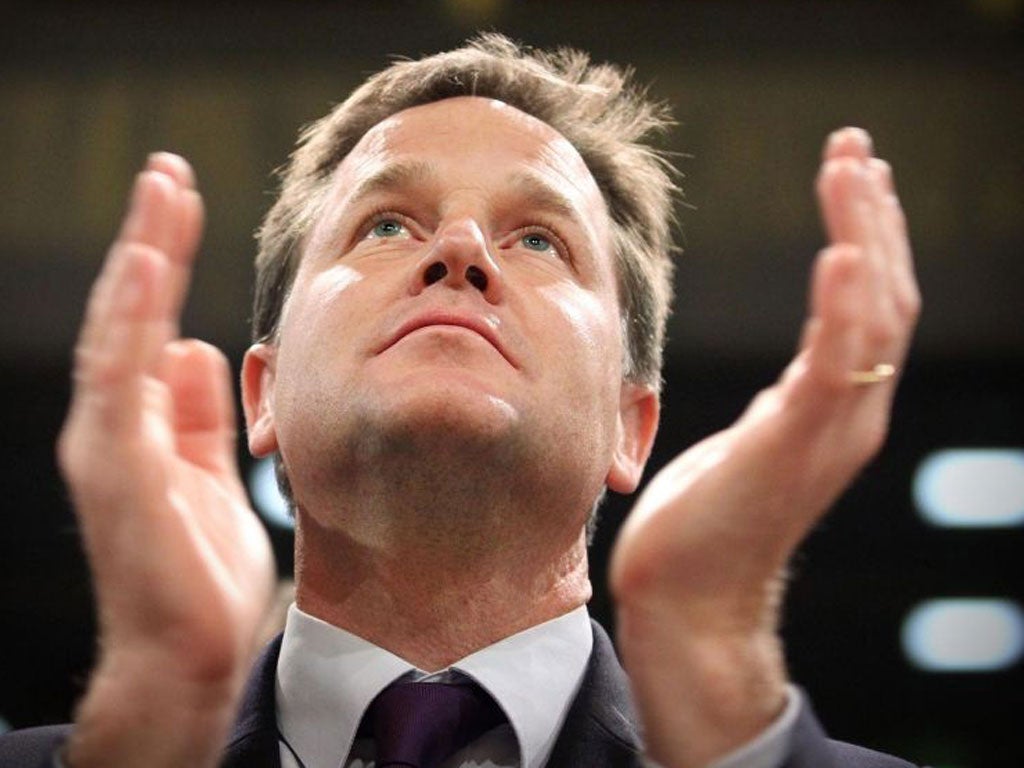The fight for the centre ground between Nick Clegg and David Cameron makes the Coalition fragile
In his latest speech, the Deputy Prime Minister tried to distinguish himself from his Tory boss and rival. But in doing so, he creates tensions that may be his undoing


Nick Clegg has learnt the art of giving speeches that are rather similar to ones he has delivered before while making them seem significant, heralding a dramatic new phase for the Coalition.
In the case of Clegg’s latest speech, a meaty one but with familiar arguments and positioning, he was greatly assisted in generating interest by a former senior adviser who suggested that if the Liberal Democrats do not become more popular next year the Coalition might not last the course. Electoral headway in 2013 for the Liberal Democrats is a very high hurdle to set, with some polls suggesting they are currently in fourth place behind Ukip.
Normally, unpopular governments stagger on until the last possible moment in the hope that something turns up that makes them popular again. John Major’s administration remained in place for five wearying years with at least as many internal tensions as the Coalition.
Indeed, many of the splits then were over the same issues as they are now, especially over Europe. Going further back, Roy Hattersley pointed out recently that Jim Callaghan did not call an early election in the autumn of 1978 because he enjoyed being Prime Minister so much, opting to cling on instead until almost the last moment in 1979. Callaghan led a government that one participant described to me as a “cauldron of hate”. It remained stubbornly in place for nearly five years with no majority. Not surprisingly, most current ministers and their opponents look to a 2015 election with both ruling parties keeping their fingers crossed that something will improve their electoral fortunes.
Act Two
Suddenly, this widely held assumption about the Coalition’s self-interested durability is challenged by Clegg’s former adviser, Richard Reeves. He argued in an article yesterday that next year would be the key test as to whether Clegg could win electoral support by claiming to be uniquely on the centre ground. Reeves outlined the high stakes in the context of Clegg’s speech also delivered yesterday, in which the leader once more sought clearer definition for his party and distinctiveness in relation to the Conservatives.
Reeves billed Clegg’s address as the start of Act Two of the Coalition, a clever portrayal as it ensured that the leader’s words secured maximum publicity. One of the many curiosities for senior Liberal Democrats is that although for the first time in their party’s life they attract considerable media interest, they struggle to convey an image other than that of malleable accomplices marching to the beat of a right -wing Conservative Party. Part of the reason for their failure to challenge the caricature is that the perception is not entirely groundless. Another is that they are still learning how to present a case in the media, having spent many years struggling to get noticed at all. On this front, they are learning fast.
Away from the hype, Clegg’s speech marked a continuity of his approach rather than a big stride in a new direction. Reeves, while still in post, used to brief journalists regularly that the strategy for the next election was to project the Liberal Democrats as the party of economic competence and social justice, a part of the centre ground. Clegg has made many speeches along these lines. Indeed, he has done so for several years. Clegg is a genuine radical in relation to tax and benefits, bolder at times than Labour, at least in terms of public proclamations.
His boldness extends to challenging, with good cause, universal benefits. Millionaires travelling free on the London Underground while low-paid workers need almost to take out a mortgage to travel a few stops is impossible to justify, although electorally risky to challenge. Elsewhere in his speech, Clegg navigated a Blair-like route between left and right, while adopting an Ed-Miliband style of reiteration. Miliband clings to “one nation” like a protective shield. Clegg repeated that his party alone was on the “centre ground” as if his survival depended on it, which it partly does.
Fragile
The obvious difference with past speeches was his assertion, briefed in advance, that he stopped specific benefit cuts from being far more drastic, those nasty Conservatives seeking billions more than he allowed them to have. The assertion and the broader strategy it represents are extremely dangerous for the Conservatives. Although the strategy has been in place for some time, Clegg plans to be clearer than he has been when the Liberal Democrats stop the Conservatives from moving rightwards in relation to precise policies.
As David Cameron also wants to claim to be on the centre ground at the next election, it is deeply undermining for him to face the prospect of the Deputy Prime Minister implying for the next two years that the Conservatives would be lurching much farther rightwards on their own. Conversely, Clegg will find it difficult to answer the charge that he alone gives those nasty Conservatives a platform to be beastly. This is the dynamic that makes the Coalition more fragile than the deeply divided Callaghan and Major governments.
The partners need each other, while threatening to gobble the other one up.

Join our commenting forum
Join thought-provoking conversations, follow other Independent readers and see their replies